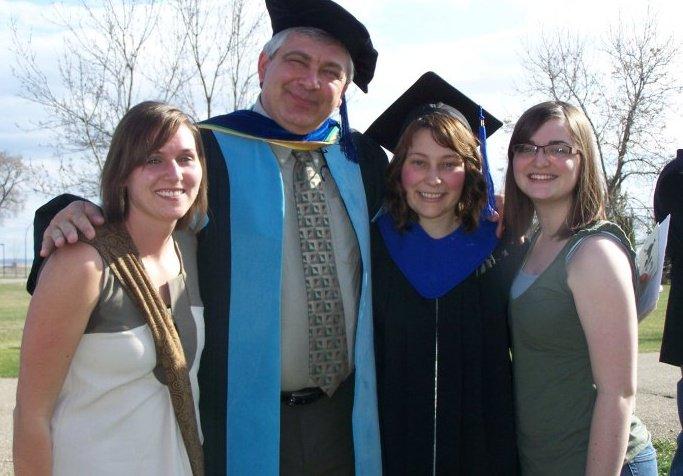A degree of influence: Briercrest humanities program prepares graduates for success

Graduates from the humanities program at Briercrest College and Seminary are finding they have more than just a degree. They have skills that help them succeed in the workforce as well as life.
“We’re trying to produce people that can communicate well, think critically, know how to learn and know how to work productively,” Brian Gobbett, Briercrest’s associate professor of history said. “I think the added value in our context is that we can produce students that will have thought about morality and ethics and hopefully will embrace the very best of that.”
The success of the humanities program may help Briercrest take steps toward some of its future goals.
Briercrest recently submitted a case to the provincial government for expanded degree granting authority. Part of this process requires a degree review. The BA in Humanities has been chosen for this review.
“We’ve made our first submission,” Gobbett explained. “It’s really a submission of intent to the government. The government will produce a list of three names and these will be experts in humanities disciplines: history, philosophy and English. They will come on campus, have a good look at our faculty, our library, our classrooms, our curriculum and they’ll make recommendations on their findings.”
Gobbett feels the program is ready for this process.
“The program is five to six years old, so it’s got legs under it,” he said. “It’s been through our own internal critique and now I think it’s ready for an external critique. I’m personally really excited about what the outside experts will say about it. I’m fairly confident they’ll see lots of good things going on there and I’m hopeful that they’ll be able to point us in some better ways too.”
Feedback from humanities graduates as well as their employers and teachers gives Gobbett good reason to feel confident about the program.
“The Humanities program at Briercrest did not merely broaden my knowledge,” Kevin Schur, 2010 graduate stated. “It helped me form a more complete picture.”
“If I’m standing in a park and there is a tree blocking my way, I can turn my head as much as I like but the tree is still blocking part of my field of vision. This only way to see around the tree is to alter the vantage point and take a few steps in either direction. Although many people don’t like to admit it, the education that they receive is merely a turning of the neck that can still leave areas out of the field of view. In the Humanities program at Briercrest, one gets to read from a variety of subjects, times, authors, and perspectives that help alter one’s vantage point to see behind the things that block our vision.”
Schur has found this exercise in perspective to be very beneficial. He says the thinking skills he gained from his Briercrest education have helped him in his graduate studies at the University of Manitoba as well as in taking entrance exams for law school.
“This degree is a great preparation for the ministry that goes on in churches, schools, courtrooms, universities, fire stations, hospitals, offices, and other locations that one may not have considered a location for ministry had they not altered their vantage point for just a moment.”
Amy Larson, a 2009 Briercrest graduate has found her Humanities degree helped her in her current position as Operations Manager for a custom home builder in Moose Jaw. She wrote the following in a letter she sent to Joel From, Briercrest professor of philosophy and humanities.
“I was just commenting to my boss the other day about how my philosophy professor used to always advocate the Humanities,” she said. “I remembered how you used to give examples of ‘in the business world’ and how Humanities students may start at lower entry level positions, Kids games but climb higher up the corporate ladder and faster than traditional business majors. I used to think ‘I’m never going to be in the business world, so that part doesn’t really apply to me.’”
As Larson did eventually enter the business world, she found her professor’s words to be true in her personal work experience.
“The challenge is wonderful (although at times very overwhelming),” she wrote. “I really feel that you were absolutely right about what you said, and that if it wasn’t for my humanities education I would never have been able to tackle such a position.”
Jessica Vanderheide, a 2010 humanities graduate is also a success story. She recently received a graduate fellowship that finances her second year of studies in the Master of Arts in History (MAIH) program at Trinity Western University.
“I began my undergraduate education at Briercrest, whether conscious of it or not, thinking that the world was simple and that I ‘knew it all,’” she explained. “It didn’t take long for my Humanities education to reveal that I was tragically misinformed. My humanities education at Briercrest has reminded me that looking beyond myself and listening to the thoughts and needs of others is not only possible but necessary if I, as a follower of Jesus, endeavor to embrace the world in love.”
Bob Burkinshaw, Director of Trinity Western’s MAIH program acknowledges the preparation a Briercrest education gave Jessica.
“I found her to be not only a very thorough, hardworking, insightful and teachable student, but one with remarkable skills for clear writing and thinking – ideal characteristics for a graduate student! Thank you for sending her to us!”
Robynne Healey, associate professor of history at Trinity Western also sings Vanderheide’s praises.
“I feel blessed to have the privilege of working with remarkable young scholars like Jessie,” she said. “It is not only that her work is of the highest caliber; it is that Jessie herself is a woman of incredible promise, integrity, and faith.”
